- Home
- Gaston Leroux
Collected Works of Gaston Leroux Page 58
Collected Works of Gaston Leroux Read online
Page 58
“That was exactly the number of wounds that were made on the body of little Jacques Zloriksky,” came in the even tones of Natacha.
“Oh, you, you always find an excuse,” grumbled the general. “Poor Boichlikoff did his duty, as I did mine.
“Yes, papa, you acted like a soldier. That is what the revolutionaries ought not to forget. But have no fears for us, papa; because if they kill you we will all die with you.”
“And gayly too,” declared Athanase Georgevitch.
“They should come this evening. We are in form!”
Upon which Athanase filled the glasses again.
“None the less, permit me to say,” ventured the timber-merchant, Thaddeus Tchnitchnikof, timidly, “permit me to say that this Boichlikoff was very imprudent.”
“Yes, indeed, very gravely imprudent,” agreed Rouletabille. “When a man has had twenty-five good bullets shot into the body of a child, he ought certainly to keep his home well guarded if he wishes to dine in peace.”
He stammered a little toward the end of this, because it occurred to him that it was a little inconsistent to express such opinions, seeing what he had done with the guard over the general.
“Ah,” cried Athanase Georgevitch, in a stage-struck voice, “Ah, it was not imprudence! It was contempt of death! Yes, it was contempt of death that killed him! Even as the contempt of death keeps us, at this moment, in perfect health. To you, ladies and gentlemen! Do you know anything lovelier, grander, in the world than contempt of death? Gaze on Feodor Feodorovitch and answer me. Superb! My word, superb! To you all! The revolutionaries who are not of the police are of the same mind regarding our heroes. They may curse the tchinownicks who execute the terrible orders given them by those higher up, but those who are not of the police (there are some, I believe) — these surely recognize that men like the Chief of the Surete our dead friend, are brave.”
“Certainly,” endorsed the general. “Counting all things, they need more heroism for a promenade in a salon than a soldier on a battle-field.”
“I have met some of these men,” continued Athanase in exalted vein. “I have found in all their homes the same — imprudence, as our young French friend calls it. A few days after the assassination of the Chief of Police in Moscow I was received by his successor in the same place where the assassination had occurred. He did not take the slightest precaution with me, whom he did not know at all, nor with men of the middle class who came to present their petitions, in spite of the fact that it was under precisely identical conditions that his predecessor had been slain. Before I left I looked over to where on the floor there had so recently occurred such agony. They had placed a rug there and on the rug a table, and on that table there was a book. Guess what book. ‘Women’s Stockings,’ by Willy! And — and then — Your health, Matrena Petrovna. What’s the odds!”
“You yourselves, my friends,” declared the general, “prove your great courage by coming to share the hours that remain of my life with me.”
“Not at all, not at all! It is war.”
“Yes, it is war.”
“Oh, there’s no occasion to pat us on the shoulder, Athanase,” insisted Thaddeus modestly. “What risk do we run? We are well guarded.”
“We are protected by the finger of God,” declared Athanase, “because the police — well, I haven’t any confidence in the police.”
Michael Korsakoff, who had been for a turn in the garden, entered during the remark.
“Be happy, then, Athanase Georgevitch,” said he, “for there are now no police around the villa.”
“Where are they?” inquired the timber-merchant uneasily.
“An order came from Koupriane to remove them,” explained Matrena Petrovna, who exerted herself to appear calm.
“And are they not replaced?” asked Michael.
“No. It is incomprehensible. There must have been some confusion in the orders given.” And Matrena reddened, for she loathed a lie and it was in tribulation of spirit that she used this fable under Rouletabille’s directions.
“Oh, well, all the better,” said the general. “It will give me pleasure to see my home ridded for a while of such people.”
Athanase was naturally of the same mind as the general, and when Thaddeus and Ivan Petrovitch and the orderlies offered to pass the night at the villa and take the place of the absent police, Feodor Feodorovitch caught a gesture from Rouletabille which disapproved the idea of this new guard.
“No, no,” cried the general emphatically. “You leave at the usual time. I want now to get back into the ordinary run of things, my word! To live as everyone else does. We shall be all right. Koupriane and I have arranged the matter. Koupriane is less sure of his men, after all, than I am of my servants. You understand me. I do not need to explain further. You will go home to bed — and we will all sleep. Those are the orders. Besides, you must remember that the guard-post is only a step from here, at the corner of the road, and we have only to give a signal to bring them all here. But — more secret agents or special police — no, no! Good-night. All of us to bed now!”
They did not insist further. When Feodor had said, “Those are the orders,” there was room for nothing more, not even in the way of polite insistence.
But before going to their beds all went into the veranda, where liqueurs were served by the brave Ermolai, as always. Matrena pushed the wheel-chair of the general there, and he kept repeating, “No, no. No more such people. No more police. They only bring trouble.”
“Feodor! Feodor!” sighed Matrena, whose anxiety deepened in spite of all she could do, “they watched over your dear life.”
“Life is dear to me only because of you, Matrena Petrovna.”
“And not at all because of me, papa?” said Natacha.
“Oh, Natacha!”
He took both her hands in his. It was an affecting glimpse of family intimacy.
From time to time, while Ermolai poured the liqueurs, Feodor struck his band on the coverings over his leg.
“It gets better,” said he. “It gets better.”
Then melancholy showed in his rugged face, and he watched night deepen over the isles, the golden night of St. Petersburg. It was not quite yet the time of year for what they call the golden nights there, the “white nights,” nights which never deepen to darkness, but they were already beautiful in their soft clarity, caressed, here by the Gulf of Finland, almost at the same time by the last and the first rays of the sun, by twilight and dawn.
From the height of the veranda one of the most beautiful bits of the isles lay in view, and the hour was so lovely that its charm thrilled these people, of whom several, as Thaddeus, were still close to nature. It was he, first, who called to Natacha:
“Natacha! Natacha! Sing us your ‘Soir des Iles.’”
Natacha’s voice floated out upon the peace of the islands under the dim arched sky, light and clear as a night rose, and the guzla of Boris accompanied it. Natacha sang:
“This is the night of the Isles — at the north of the world. The sky presses in its stainless arms the bosom of earth, Night kisses the rose that dawn gave to the twilight. And the night air is sweet and fresh from across the shivering gulf, Like the breath of young girls from the world still farther north. Beneath the two lighted horizons, sinking and rising at once, The sun rolls rebounding from the gods at the north of the world. In this moment, beloved, when in the clear shadows of this rose-stained evening I am here alone with you, Respond, respond with a heart less timid to the holy, accustomed cry of ‘Good-evening.’”
Ah, how Boris Nikolaievitch and Michael Korsakoff watched her as she sang! Truly, no one ever can guess the anger or the love that broods in a Slavic heart under a soldier’s tunic, whether the soldier wisely plays at the guzla, as the correct Boris, or merely lounges, twirling his mustache with his manicured and perfumed fingers, like Michael, the indifferent.
Natacha ceased singing, but all seemed to be listening to her still — the convivial group on the
terrace appeared to be held in charmed attention, and the porcelain statuettes of men on the lawn, according to the mode of the Iles, seemed to lift on their short legs the better to hear pass the sighing harmony of Natacha in the rose nights at the north of the world.
Meanwhile Matrena wandered through the house from cellar to attic, watching over her husband like a dog on guard, ready to bite, to throw itself in the way of danger, to receive the blows, to die for its master — and hunting for Rouletabille, who had disappeared again.
III. THE WATCH
SHE WENT OUT to caution the servants to a strict watch, armed to the teeth, before the gate all night long, and she crossed the deserted garden. Under the veranda the schwitzar was spreading a mattress for Ermolai. She asked him if he had seen the young Frenchman anywhere, and after the answer, could only say to herself, “Where is he, then?” Where had Rouletabille gone? The general, whom she had carried up to his room on her back, without any help, and had helped into bed without assistance, was disturbed by this singular disappearance. Had someone already carried off “their” Rouletabille? Their friends were gone and the orderlies had taken leave without being able to say where this boy of a journalist had gone. But it would be foolish to worry about the disappearance of a Journalist, they had said. That kind of man — these journalists — came, went, arrived when one least expected them, and quitted their company — even the highest society — without formality. It was what they called in France “leaving English fashion.” However, it appeared it was not meant to be impolite. Perhaps he had gone to telegraph. A journalist had to keep in touch with the telegraph at all hours. Poor Matrena Petrovna roamed the solitary garden in tumult of heart. There was the light in the general’s window on the first floor. There were lights in the basement from the kitchens. There was a light on the ground-floor near the sitting-room, from Natacha’s chamber window. Ah, the night was hard to bear. And this night the shadows weighed heavier than ever on the valiant breast of Matrena. As she breathed she felt as though she lifted all the weight of the threatening night. She examined everything — everything. All was shut tight, was perfectly secure, and there was no one within excepting people she was absolutely sure of — but whom, all the same, she did not allow to go anywhere in the house excepting where their work called them. Each in his place. That made things surer. She wished each one could remain fixed like the porcelain statues of men out on the lawn. Even as she thought it, here at her feet, right at her very feet, a shadow of one of the porcelain men moved, stretched itself out, rose to its knees, grasped her skirt and spoke in the voice of Rouletabille. Ah, good! it was Rouletabille. “Himself, dear madame; himself.”
“Why is Ermolai in the veranda? Send him back to the kitchens and tell the schwitzar to go to bed. The servants are enough for an ordinary guard outside. Then you go in at once, shut the door, and don’t concern yourself about me, dear madame. Good-night.”
Rouletabille had resumed, in the shadows, among the other porcelain figures, his pose of a porcelain man.
Matrena Petrovna did as she was told, returned to the house, spoke to the schwitzar, who removed to the lodge with Ermolai, and their mistress closed the outside door. She had closed long before the door of the kitchen stair which allowed the domestics to enter the villa from below. Down there each night the devoted gniagnia and the faithful Ermolai watched in turn.
Within the villa, now closed, there were on the ground-floor only Matrena herself and her step-daughter Natacha, who slept in the chamber off the sitting-room, and, above on the first floor, the general asleep, or who ought to be asleep if he had taken his potion. Matrena remained in the darkness of the drawing-room, her dark-lantern in her hand. All her nights passed thus, gliding from door to door, from chamber to chamber, watching over the watch of the police, not daring to stop her stealthy promenade even to throw herself on the mattress that she had placed across the doorway of her husband’s chamber. Did she ever sleep? She herself could hardly say. Who else could, then? A tag of sleep here and there, over the arm of a chair, or leaning against the wall, waked always by some noise that she heard or dreamed, some warning, perhaps, that she alone had heard. And to-night, to-night there is Rouletabille’s alert guard to help her, and she feels a little less the aching terror of watchfulness, until there surges back into her mind the recollection that the police are no longer there. Was he right, this young man? Certainly she could not deny that some way she feels more confidence now that the police are gone. She does not have to spend her time watching their shadows in the shadows, searching the darkness, the arm-chairs, the sofas, to rouse them, to appeal in low tones to all they held binding, by their own name and the name of their father, to promise them a bonus that would amount to something if they watched well, to count them in order to know where they all were, and, suddenly, to throw full in their face the ray of light from her little dark-lantern in order to be sure, absolutely sure, that she was face to face with them, one of the police, and not with some other, some other with an infernal machine under his arm. Yes, she surely had less work now that she had no longer to watch the police. And she had less fear!
She thanked the young reporter for that. Where was he? Did he remain in the pose of a porcelain statue all this time out there on the lawn? She peered through the lattice of the veranda shutters and looked anxiously out into the darkened garden. Where could he be? Was that he, down yonder, that crouching black heap with an unlighted pipe in his mouth? No, no. That, she knew well, was the dwarf she genuinely loved, her little domovoi-doukh, the familiar spirit of the house, who watched with her over the general’s life and thanks to whom serious injury had not yet befallen Feodor Feodorovitch — one could not regard a mangled leg that seriously. Ordinarily in her own country (she was from the Orel district) one did not care to see the domovoi-doukh appear in flesh and blood. When she was little she was always afraid that she would come upon him around a turn of the path in her father’s garden. She always thought of him as no higher than that, seated back on his haunches and smoking his pipe. Then, after she was married, she had suddenly run across him at a turning in the bazaar at Moscow. He was just as she had imagined him, and she had immediately bought him, carried him home herself and placed him, with many precautions, for he was of very delicate porcelain, in the vestibule of the palace. And in leaving Moscow she had been careful not to leave him there. She had carried him herself in a case and had placed him herself on the lawn of the datcha des Iles, that he might continue to watch over her happiness and over the life of her Feodor. And in order that he should not be bored, eternally smoking his pipe all alone, she had surrounded him with a group of little porcelain genii, after the fashion of the Jardins des Iles. Lord! how that young Frenchman had frightened her, rising suddenly like that, without warning, on the lawn. She had believed for a moment that it was the domovoi-doukh himself rising to stretch his legs. Happily he had spoken at once and she had recognized his voice. And besides, her domovoi surely would not speak French. Ah! Matrena Petrovna breathed freely now. It seemed to her, this night, that there were two little familiar genii watching over the house. And that was worth more than all the police in the world, surely. How wily that little fellow was to order all those men away. There was something it was necessary to know; it was necessary therefore that nothing should be in the way of learning it. As things were now, the mystery could operate without suspicion or interference. Only one man watched it, and he had not the air of watching. Certainly Rouletabille had not the air of constantly watching anything. He had the manner, out in the night, of an easy little man in porcelain, neither more nor less, yet he could see everything — if anything were there to see — and he could hear everything — if there were anything to hear. One passed beside him without suspecting him, and men might talk to each other without an idea that he heard them, and even talk to themselves according to the habit people have sometimes when they think themselves quite alone. All the guests had departed thus, passing close by him, almost brushing him, had
exchanged their “Adieus,” their “Au revoirs,” and all their final, drawn-out farewells. That dear little living domovoi certainly was a rogue! Oh, that dear little domovoi who had been so affected by the tears of Matrena Petrovna! The good, fat, sentimental, heroic woman longed to hear, just then, his reassuring voice.
“It is I. Here I am,” said the voice of her little living familiar spirit at that instant, and she felt her skirt grasped. She waited for what he should say. She felt no fear. Yet she had supposed he was outside the house. Still, after all, she was not too astonished that he was within. He was so adroit! He had entered behind her, in the shadow of her skirts, on all-fours, and had slipped away without anyone noticing him, while she was speaking to her enormous, majestic schwitzar.
“So you were here?” she said, taking his hand and pressing it nervously in hers.
“Yes, yes. I have watched you closing the house. It is a task well-done, certainly. You have not forgotten anything.”
“But where were you, dear little demon? I have been into all the corners, and my hands did not touch you.”
“I was under the table set with hors-d’oeuvres in the sitting-room.”
“Ah, under the table of zakouskis! I have forbidden them before now to spread a long hanging cloth there, which obliges me to kick my foot underneath casually in order to be sure there is no one beneath. It is imprudent, very imprudent, such table-cloths. And under the table of zakouskis have you been able to see or hear anything?”
“Madame, do you think that anyone could possibly see or hear anything in the villa when you are watching it alone, when the general is asleep and your step-daughter is preparing for bed?”
“No. No. I do not believe so. I do not. No, oh, Christ!”
They talked thus very low in the dark, both seated in a corner of the sofa, Rouletabille’s hand held tightly in the burning hands of Matrena Petrovna.

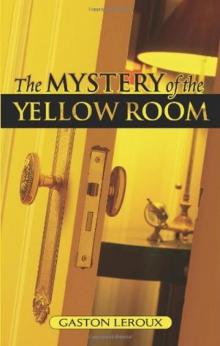 The Mystery of the Yellow Room
The Mystery of the Yellow Room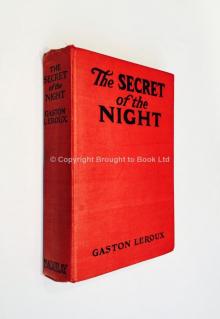 The Secret of the Night
The Secret of the Night In Letters of Fire
In Letters of Fire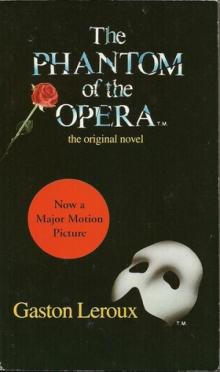 The Phantom of the Opera
The Phantom of the Opera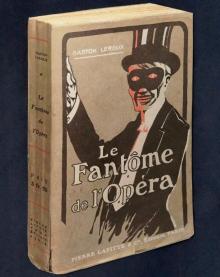 Fantôme de l'Opéra. English
Fantôme de l'Opéra. English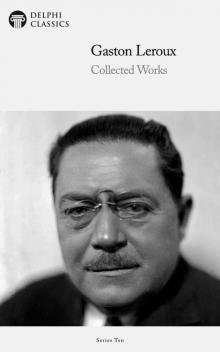 Collected Works of Gaston Leroux
Collected Works of Gaston Leroux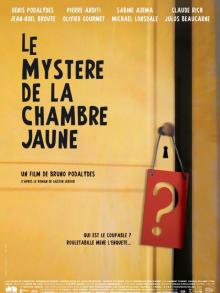 Le mystère de la chambre jaune. English
Le mystère de la chambre jaune. English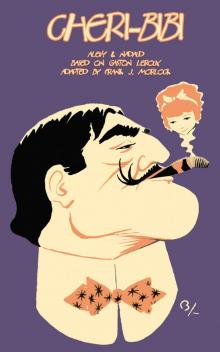 Cheri-Bibi: The Stage Play
Cheri-Bibi: The Stage Play The Phantom of the Opera (Oxford World's Classics)
The Phantom of the Opera (Oxford World's Classics)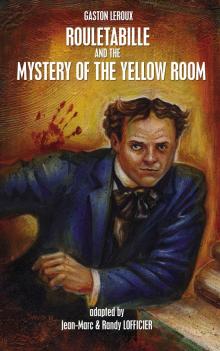 Rouletabille and the Mystery of the Yellow Room
Rouletabille and the Mystery of the Yellow Room The Perfume of the Lady in Black
The Perfume of the Lady in Black The Bloody Doll
The Bloody Doll Rouletabille at Krupp's
Rouletabille at Krupp's Phantom of the Opera (Barnes & Noble Classics Series)
Phantom of the Opera (Barnes & Noble Classics Series)